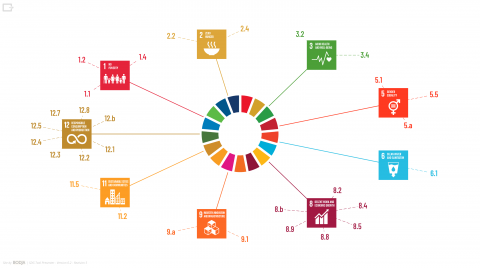Collaborators in Cambridge[1] have launched a new tool designed to help conservation practitioners engage with the Sustainable Development Goals (SDGs) and, within this framework, the wider human and societal benefits of their work.
This tool launches on the same day as the Cambridge Conservation Initiative[2] hosts an event featuring Sir David Attenborough at the World Economic Forum’s Annual Meeting in Davos, exploring the role of nature in delivering the Sustainable Development Goals.
The World Economic Forum Global Risks Report 2019 places Biodiversity Loss and Ecosystem Collapse in the most serious categories of its risk framework. Together with extreme weather events, natural disasters, water crises and the failure of climate change mitigation and adaptation, it is clear that the risk perceptions of the global community increasingly recognise the key role that nature and the environment play in relation to human wellbeing on this planet.
The UN SDGs provide a ‘Blueprint for Building a Better World’ between 2015 and 2030, and are increasingly used as the framework that guides governments, businesses and third sector organisations that are working towards planetary and human wellbeing. They are universal, integrative and transformative.
The SDGs are explicit about the importance of the natural world, especially the headline goals on marine and terrestrial life, and on climate change. But, the role of nature in supporting the SDGs is much broader, and can be hidden in the headline commitments. Conservation actions can contribute positively to achieving a much wider range of targets, in keeping with their integrative approach.
Professor Bhaskar Vira, Director of the University of Cambridge Conservation Research Institute (UCCRI) said “As we look to the future, we need to recognise that wise investments in nature are also investments in a safer, healthier and less unequal world. There are close links between planetary and human wellbeing, and our future prosperity depends on understanding and acting urgently to support these relationships.”.
Collaborators at Cambridge have developed an online tool to help users find the SDG targets which are relevant to their own project, programme or other initiative. It is aimed at biodiversity-conservation initiatives but may also be useful to people working in other fields.

The SDGs provide a framework to understand the impacts that biodiversity and ecosystems make to a wide range of global goals. The tool was developed to allow practitioners to easily find their projects’ contribution to sustainability, as well as to health, equality, justice and climate change mitigation and adaptation. While these contributions might be relatively small in themselves, they cumulatively demonstrate the ways in which we depend on nature, and why biodiversity loss and ecosystem collapse are increasingly seen as major threats.
The associated event at Davos will be livestreamed on Tuesday 22 January at 11am (GMT).
Follow us on Twitter @cambridge_uccri
[1] The SDG Tool was created from a collaborative project of the Cambridge Conservation Initiative (Unusual Suspects: what contributions can biodiversity conservation organisations make to the Sustainable Development Goals?) partners include UCCRI, BirdLife, RSPB, FFI and iied Its development was funded by the ESRC and the Cambridge Conservation Initiative.
[2] The Cambridge Conservation Initiative (CCI) is a collaboration between nine leading biodiversity conservation organisations based in and around the city of Cambridge, and the University of Cambridge. By catalysing strategic partnerships between leaders in research, education, policy and practice CCI aims to transform the global understanding and conservation of biodiversity and, through this, secure a sustainable future for biodiversity and society. The CCI partners are BirdLife International, British Trust for Ornithology (BTO), Cambridge Conservation Forum (CCF), IUCN, Fauna & Flora International (FFI), RSPB, TRAFFIC, Tropical Biology Association (TBA), UNEP-WCMC and the University of Cambridge
